Super User
Körber Business Area Tissue’s Tissue Innovation Days to start again on September 27 and October 4
Over the course of these two days customers and partners will be able to discover the innovations that Körber Business Area Tissue is developing in the automation and digital fields
In order to meet the needs of all customers and partners there are two sessions scheduled by Körber Business Area Tissue for each of the themed days of September 27 and October 4.
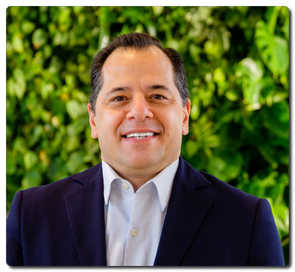 Mauro Luna, Chief Sales & Marketing Officer Körber Business Area TissueSeptember 27 will focus on Auto Web Starter, an innovative solution in the field of automation in the tissue industry. During the two sessions scheduled for this day it will be possible to discover and discuss how the use of fully automated systems can help in the management and processing of tissue.
Mauro Luna, Chief Sales & Marketing Officer Körber Business Area TissueSeptember 27 will focus on Auto Web Starter, an innovative solution in the field of automation in the tissue industry. During the two sessions scheduled for this day it will be possible to discover and discuss how the use of fully automated systems can help in the management and processing of tissue.
On October 4 the two sessions will be dedicated to presenting Körber’s digital offers, a selection of intelligent services and solutions that combine artificial intelligence and big data with the technological experience that distinguishes the machines developed and presented on the market by Körber Business Area Tissue. An example of these solutions is FactoryPal's Boost designed to constantly optimize machine settings for maximum OEE.
“We are happy restart the Tissue Innovation Days after the summer break. These days are of great value for us, not only to create new bonds and consolidate existing relationships with our customers, but also because these are important occasions to let companies know the different fields in which we at Körber Business Area Tissue can support their business as a strategic partner offering 360 ° solutions” comments Mauro Luna, Chief Sales & Marketing Officer Körber Business Area Tissue.
To subscribe to the webinar just register at the following link: Tissue Innovation Days_ 27thSeptember-4thOctober_2022
Körber Business Area Tissue
At Körber, our ultimate goal is to empower our customers’ ongoing success. We are the only truly integrated and global provider of advanced solutions for the tissue business. We offer the industry’s most comprehensive portfolio of tissue technology to support customers across the entire value chain — from roll to fold, from converting to packaging. Our advanced, automated, and easy-to-use integrated solutions are a fundamental asset to shape the success in tissue, take our customers operations to the next level, and strengthen their overall financial performance while optimizing their total cost of ownership.
About Körber
We are Körber – an international technology group with about 12,000 employees, more than 100 locations worldwide and a common goal: We turn entrepreneurial thinking into customer success and shape the technological change. In the Business Areas Digital, Pharma, Supply Chain, Technologies and Tissue, we offer products, solutions and services that inspire. We act fast to customer needs, we execute ideas seamlessly, and with our innovations we create added value for our customers. In doing so, we are increasingly building on ecosystems that solve the challenges of today and tomorrow. Körber AG is the holding company of the Körber Group.
Sappi Europe announces price rises for its Coated Mechanical Reel products
Due to continuing high cost and volatility in raw materials, energy and transportation Sappi Europe has announced a price increase to its Coated Mechanical reels. The adjustment will range between 6-9% and will be implemented during the month of October.
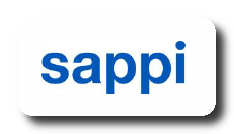 Sappi’s European sales team will be in further contact directly with customers to discuss the details of the implementation.
Sappi’s European sales team will be in further contact directly with customers to discuss the details of the implementation.
The business climate remains extremely challenging for everyone, and Sappi appreciates all its customers support in these difficult times.
Sappi is a leading global provider of sustainable woodfibre products and solutions, in the fields of Dissolving pulp, Printing papers, Packaging and Speciality papers, Casting and release papers, Biomaterials and Bio-energy. As a company that relies on renewable natural resources, sustainability is at our core. Sappi European mills hold chain of custody certifications under the Forest Stewardship Council™ (FSC™ C015022) and the Programme for the Endorsement of Forest Certification (PEFC/07-32-76) systems. Our papers are produced in mills accredited with ISO 9001, ISO 14001, ISO 50 001 and ISO
45 001 certification. We have EMAS registration at 5 of our 10 mills in Europe.
Sappi Europe is a division of Sappi Limited (JSE), headquartered in Johannesburg, South Africa, with 12,500 employees and 19 production facilities on three continents in nine countries, 37 sales offices globally, and customers in over 150 countries around the world.
Learn more about Sappi at www.sappi.com
European Carton Excellence Award winners announced
2022 winners highlight innovation and sustainability in recycled and virgin fibre-based packaging
The judges of the 2022 European Carton Excellence Awards have revealed the winners of the 2022 competition. Rutgers Printing & Packaging Solutions ‘masterpiece of elementary and sustainable design’ for cherry tomatoes was crowned the Carton of the Year during the annual European Carton Makers Association (ECMA) Congress in Kraków, Poland.
Made entirely from food-safe renewable virgin fibre cartonboard manufactured by Stora Enso, the folding box strikes the perfect balance between maximising product visibility while maintaining rigidity. With a smooth white surface and unbleached inside, it conveys absolute eco-friendliness, and it is easily re-closable with a ‘click’ even after multiple uses, reassuring consumers that it is locked. Thanks to its shape, more boxes can be placed on a pallet than traditional plastic designs, saving costs, increasing transportation efficiency and reducing emissions. Crucially, approximately 67 tonnes of plastic are avoided by using cartonboard for 1 million boxes. After use, the boxes can be completely flattened and disposed of in the carton recycling stream.
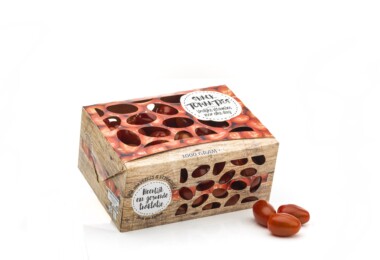 Carton of the year: Cherry tomatoes pack
Carton of the year: Cherry tomatoes pack
The judges – including consultant for branding and design, Satkar Gidda, leading packaging designer Susanne Lippitsch and Global Packaging Director for Unilever, Sanjeev Das – were keen to praise the simplicity of the design, which can be opened with one hand. They also appreciated the presentation of the pack – remarking that it looks great on the table, on the shelf and in the refrigerator – as well as the design of the airflow with the cherry tomato-style punched in holes. Together, all these elements – combined with the fact that it is a single-piece construction – resulted in it being selected as the Carton of the Year.
In addition to the Carton of the Year, winners were also selected across a number of other categories including Sustainability, Innovation, General Packaging – Virgin Fibre, General Packaging – Recycled Fibre, Food & Drink Packaging – Virgin Fibre and Food & Drink Packaging – Recycled Fibre. Platinum and Gold awards were also given to designs that the judges deemed particularly outstanding and deserved special recognition.
Sustainability success
Van Genechten Packaging’s flexible solution for Herbal Essences’ Shampoo Conditioner bundle, created using cartonboard from Metsä Board, scooped the top award in the Sustainability category thanks to its simple, effective design which uses minimal cartonboard while perfectly holding the products together. In addition to its sustainability credentials, the sleeve also creates a new communication platform, allows cross-selling of different products, and has proven to be an excellent sales accelerator. The cut-out windows also allow the consumer to view the scent or flavour of the product inside as well as enabling them to easily read the ingredients list.
The judges praised the design, commenting on its simple yet effective on-shelf appeal and ability to heighten brand communication. “The presentation is fantastic and the consumer knew exactly how it should be used as the brand and content message are very quickly conveyed”, they commented.
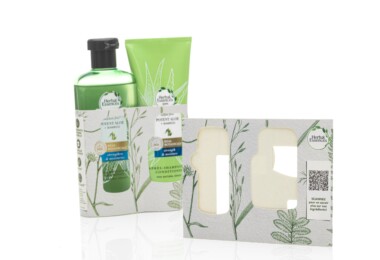 Sustainability category winner: Herbal Essences Shampoo Conditioner bundle
Sustainability category winner: Herbal Essences Shampoo Conditioner bundle
Incredible Innovation Board Supplier West Rock
“Minimalistic yet premium” sums up the winning pack design from WestRock for Nestlé’s Sanpellegrino® Aranciata Rossa in the Innovation category. Carton converter and manufacturer WestRock created the Cluster-Pak carrier with barcode masking at the top and can-locker at the bottom, allowing for clean 360° product visibility and billboarding while still using as little material as possible. As Sanpellegrino is exported globally to markets where barcodes need to be covered at the point of sale, it required a folded panel at the top to avoid a single unit scan when buying a multipack. By using a mechanical lock, it is also glue-free and easy to recycle. According to the judges “it’s the locking system of this carton construction that is so amazing as it locks without glue and is fundamentally very stable and functional.”
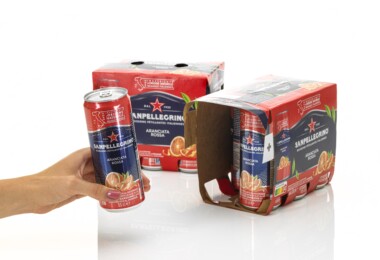 Innovation Category Winner: Sanpellegrino Aranciata Rossa by Nestle
Innovation Category Winner: Sanpellegrino Aranciata Rossa by Nestle
General Packaging – Virgin Fibre
Faller Packaging took home the General Packaging – Virgin Fibre award for its PleioFlow RF Device carrier using cartonboard from Holmen Iggesund. Designed to keep this complex medical device – with all its wires, tubes and instruments – in a stable position, guarantee its safety and protect the micro-biological barrier, the functionality of this carrier is its most important attribute. The unprinted card allows the SterinClin pouches to be visually inspected for any particle residues in the pouches themselves as well as in the cracks and any other damage that may occur. It is also easy for surgeons to open and unmount the product from the carrier within the sterile surrounding of the operating theatre – “a masterpiece of plastic replacement and a simple example of cartonboard for the medical industry” according to the judges.
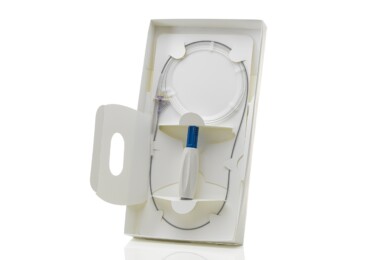 General Packaging – Virgin Fibre award for its PleioFlow RF Device carrier
General Packaging – Virgin Fibre award for its PleioFlow RF Device carrier
General Packaging – Recycled Fibre
Lucaprint’s Fanton Power strip Relife won the General Packaging – Recycled Fibre category for its new eco-sustainable line of ‘Made in Italy’ multi-sockets, created with RDM’s certified recycled cartonboard material. The packaging, which replaces classic plastic wrapping with recycled cartonboard, is equipped with a tamper-evident system and the case is optimised for the industrial process. A completely mono-material case concept, it does not have a lining or coating, highlighting the sustainability credentials of the contents. Overall, the packaging protects the product and makes it visible to the consumer, providing excellent on-shelf presentation and branding. The judges described it as “a wonderful piece of cartonboard engineering which fixes the product inside.”
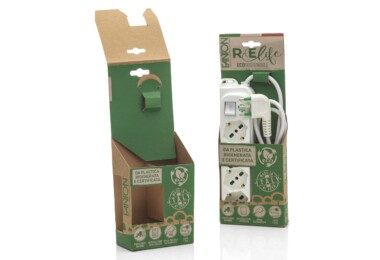 General Packaging - Recycled Fibre winner: Fanton Power striip Relife
General Packaging - Recycled Fibre winner: Fanton Power striip Relife
Food & Drink Packaging – Virgin Fibre
Autajon Durero Packaging’s design for Match Tonic bottles was crowned Food & Drink Packaging – Virgin Fibre winner thanks to the innovative design of its e-commerce pack specifically conceived to house four units of the company’s square recycled glass bottles. The package uses Stora Enso cartonboard. Matching the aesthetics of the bottle – square with round corners in the shape of a basket – the multi-pack unit design features folding handles that mean it is easy to carry and space-efficient for transportation. Multiple layers can also be stacked on pallets without the need for additional protective sheets. The structure is user-friendly and ergonomic while the graphics are simple and clean resulting in a visually striking end design. According to the judges, the pack is very clever thanks to its “optimal use of material – not too much, not too little. It perfectly wraps around the shape of the bottles and has an attractive, minimalistic graphic design.”
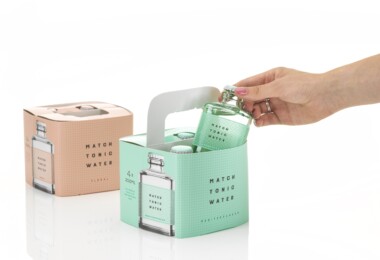 Food & Drink packaging - Virgin Fibre winner: Match Tonic bottles
Food & Drink packaging - Virgin Fibre winner: Match Tonic bottles
Food & Drink Packaging – Recycled Fibre
MM Packaging’s potato pack – winner of the Food & Drink Packaging – Recycled Fibre award – is, according to the judges, “a fantastic piece of work that can be opened and closed very easily with comfortable carrying ergonomics.” The cartonboard is manufactured by MM Board & Paper, and is entirely plastic-free, the box features a convenient carrying handle and solid crash lock bottom. A clear cellulose window film – which is food grade, biodegradable and OK compost HOME certified – means the freshness of the potatoes can be inspected by consumers before purchase, while the smooth, easily printable surface provides ample space for graphics, recipe solutions and large barcodes. The shape of the pack is interesting for a retail environment, providing excellent on-shelf stand-out and brand communication opportunities.
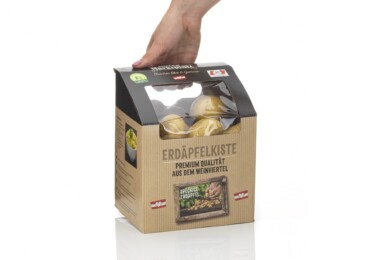 Food & Drink Packaging - Recycled Fibre winner: Potato pack
Food & Drink Packaging - Recycled Fibre winner: Potato pack
Winfried Muehling, General Manager of Pro Carton commented: “We were truly excited and proud by the quality of the entries for the European Carton Excellence Awards this year. The designs are becoming increasingly more sophisticated and diverse, with a greater focus on consumer handling and material usage. Over the years, the environmental value of cartons and cartonboard has become more significant. The 2022 entries clearly document the lead cartonboard and folding boxes take on the road to circularity. True symbols of change.
We extend our congratulations to all the winners of the European Carton Excellence Awards and thank all those who entered. We look forward to hearing even more about their successes in the year to come and invite all companies to enter again next year.”
About Pro Carton
Pro Carton is the European Association of Carton and Cartonboard manufacturers. Its main purpose is to promote the use of cartons and cartonboard as an economically and ecologically balanced packaging medium. www.procarton.com
Kemira announces energy surcharge for all product lines in North America
Kemira is implementing a 4% energy surcharge for all Pulp and Paper processes and functional chemistries across North America for all non-contract customers, effective October 1, 2022. The surcharge announced in April for inorganic coagulants sold through our Industry & Water segment remains in effect.
 As direct and indirect energy costs continue to rise, Kemira is seeing a significant impact to its facilities and the breadth of its global supply chain and logistics capabilities. We have taken steps to mitigate the increases over the last 18 months, but there is no sign of reversing the continuing upward trend for these costs while we are in an inflationary environment. Implementing the surcharge will help to offset these continued cost increases. We will review the need for the surcharge as well as the percentage on a quarterly basis.
As direct and indirect energy costs continue to rise, Kemira is seeing a significant impact to its facilities and the breadth of its global supply chain and logistics capabilities. We have taken steps to mitigate the increases over the last 18 months, but there is no sign of reversing the continuing upward trend for these costs while we are in an inflationary environment. Implementing the surcharge will help to offset these continued cost increases. We will review the need for the surcharge as well as the percentage on a quarterly basis.
“We are hopeful the current energy cost landscape is a temporary situation. Although we implemented the surcharge for our industrial customers in April, we are monitoring the development and will make necessary adjustments based on significant changes to energy costs,” says Michael Cavallero, VP, Industry & Water Commercial, Americas.
“We are really proud of how we have managed the global supply chain disruptions over the past 18 months. We have proven to be a reliable and sustainable supplier for all of our customers. By implementing this energy surcharge to our non-contract customers, we can continue focusing on security of supply and our ability to deliver an excellent customer experience,” says Tuija Pohjolainen-Hiltunen, SVP, Pulp & Paper Commercial, Americas.
Kemira is a global leader in sustainable chemical solutions for water intensive industries. We provide best suited products and expertise to improve our customers’ product quality, process and resource efficiency. Our focus is on pulp & paper, water treatment and energy industry. In 2021, Kemira had annual revenue of around EUR 2.7 billion and around 5,000 employees. Kemira shares are listed on the Nasdaq Helsinki Ltd.
www.kemira.com
Smurfit Kappa acquires packaging plant in Rio de Janeiro
The purchase of PaperBox expands both the company’s presence in Brazil and its product portfolio
 Smurfit Kappa, one of the world’s leading suppliers of paper-based packaging, announced it has signed an agreement to acquire PaperBox, a packaging plant located in Saquarema, 70 kms east of Rio de Janeiro. The transaction, which is subject to the approval of regulatory bodies, is expected to close at the end of October.
Smurfit Kappa, one of the world’s leading suppliers of paper-based packaging, announced it has signed an agreement to acquire PaperBox, a packaging plant located in Saquarema, 70 kms east of Rio de Janeiro. The transaction, which is subject to the approval of regulatory bodies, is expected to close at the end of October.
Brazil is the largest corrugated cardboard market in Latin America, with 7.4 bn sq m produced annually, and the Southeast region, where PaperBox is located, equates to 46% of this volume. This acquisition represents a further expansion of Smurfit Kappa’s operational footprint in Brazil as it currently operates in three other states: Minas Gerais, Rio Grande do Sul and Ceará.
“We are very proud to expand our footprint in Brazil to meet the growing demand for innovative and sustainable packaging. This acquisition will broaden and strengthen our presence in the country, improve our production capabilities and enable us to continue to create new opportunities and form new partnerships with customers,” said Laurent Sellier, CEO of Smurfit Kappa in the Americas.
Manuel Alcalá, CEO of Smurfit Kappa in Brazil, added: “Smurfit Kappa believes in Brazil and in the opportunities to deliver growth by continuing to add value to our customers business. PaperBox has a distinguished history in the region and a special commitment to all stakeholders. This is a legacy that Smurfit Kappa will build upon.”
New design of the successful automation solution OnQ FormingSens ensures optimized real-time measurement of water weight in the forming section
OnQ FormingSens has a long track record of benefitting paper manufacturers of different grades, with more than 100 systems are already in use in the forming section worldwide. Thanks to microwave technology, the leading solution measures fluctuations in water weight precisely, reliably and in real-time. Based on this information, papermakers can systematically improve their settings, achieve a stable dry content at the end of the forming section, and utilize the maximum dewatering capacity in the press section. At the same time, the optimized settings ensure less wear on the forming fabrics and ceramics. In addition, vacuum and drive energy usage can be reduced, which was confirmed, among others, by a Central European packaging papers manufacturer. Here, OnQ FormingSens reduces energy costs by around 130,000 euros per year and pays for itself in well under a year. For maximum user-friendliness and reliability, Voith experts have now further optimized the design of the solution.
- Based on many years of experience and profound know-how, Voith improves the design of OnQ FormingSens for optimized lifetime, reliability and operator friendliness
- Thanks to real-time measurement, the operator continuously receives information about the dry content in the forming section and can optimize the vacuum settings
- In combination with the OnC.Dewatering automatic vacuum control system, layer bonding in the forming section can be improved and energy requirements reduced
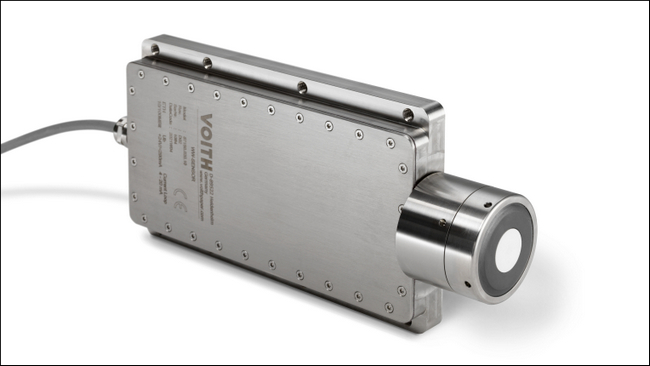
"Compared to the previous OnQ FormingSens, the new generation has a significantly longer service life, flexible connection options to existing process control systems, and improved mechanical stability, thus enabling extremely reliable measurement results," says the responsible project manager, Jörg Spindler, Manager Actuator Development at Voith Paper. The new design focuses on solid, low-vibration construction, as well as a simplified electrical design. Among other things, Voith's experts reworked the mechanical mount so that the operator can now fine-tune the penetration depth from outside the machine via waterproof mechanical gear. The sensor holder can be flexibly positioned on various existing dewatering elements in the former. Compared to hand-held measuring devices, the permanently installed application is characterized by higher safety, as no direct contact with the operator with the forming fabrics is necessary. An improved sensor housing ensures higher long-term stability. The new generation OnQ FormingSens is installed to a nearby terminal box, which can be serviced by Voith experts via a service connection. This allows the optimized solution to be better connected to customers' existing infrastructures, such as the process control system.
Combination with OnC.Dewatering control system
Based on the measurements of OnQ FormingSens, the control loop can be closed with the fully automatic dewatering control OnC.Dewatering. The control system defines and stabilizes the dry content of each layer produced and thus significantly increases ply bond on multi-ply machines. Further information on the automation solutions can be found here: https://voith.com/corp-en/products-services/automation-digital-solutions/onquality.html?130226%5B%5D=0
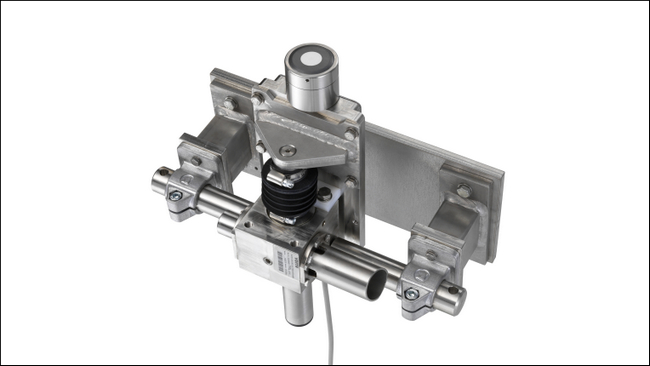
About the Voith Group
The Voith Group is a global technology company. With its broad portfolio of systems, products, services and digital applications, Voith sets standards in the markets of energy, paper, raw materials and transport & automotive. Founded in 1867, the company today has around 20,000 employees, sales of € 4.3 billion and locations in over 60 countries worldwide and is thus one of the larger family-owned companies in Europe.
The Group Division Voith Paper is part of the Voith Group. As the full-line supplier to the paper industry, it provides the largest range of technologies, services and products on the market and offers paper manufacturers holistic solutions from a single source. The company’s continuous stream of innovations facilitates resource-conserving production and helps customers minimize their carbon footprint. With its leading automation products and digitalization solutions from the Papermaking 4.0 portfolio, Voith offers its customers state-of-the-art digital technologies to improve plant availability and efficiency for all sections of the production process.
Toscotec to showcase breakthrough innovations at MIAC 2022
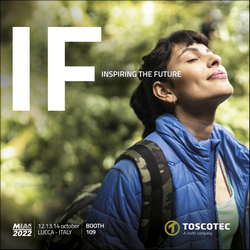 Toscotec will showcase technological breakthroughs designed for the paper mill of the future at MIAC 2022 from 12th to 14th October in Lucca, Italy.
Toscotec will showcase technological breakthroughs designed for the paper mill of the future at MIAC 2022 from 12th to 14th October in Lucca, Italy.
Toscotec has developed two paper drying innovations aimed to cut direct greenhouse gas emissions to zero. TT Induction SYD, a revolutionary Steel Yankee Dryer design using electrical induction to dry paper, and TT Hydrogen Burner, a new generation of 100% hydrogen-fueled burners for Yankee hoods.
At MIAC Conferences, Toscotec will present:
- Tissue Conference, 12th October: Elena Troia, Energy & Environment Sales Manager, will illustrate how renewables-powered technology can deliver the highest production while slashing emissions, with a presentation titled “Breakthrough tissue innovations for sustainable drying”.
- Paperboard Conference, 14th October: Giancarlo Gianlorenzi, Sales Manager Toscotec Paper & Board and Oliver Thomas, Sales Manager Voith, will talk about “Papierfabrik Niederauer Mühle’s rebuild case study” presenting Voith and Toscotec’s joint PM2 rebuild project for German paper manufacturer Papierfabrik Niederauer Mühle.
Contacts to book an appointment at Toscotec’s booth 109:
Enrico Fazio, Sales Director, Paper & Board division, This email address is being protected from spambots. You need JavaScript enabled to view it.
Marco Dalle Piagge, Sales Director, Tissue division, This email address is being protected from spambots. You need JavaScript enabled to view it.
Arbor Month - Why South African businesses going paperless can do more harm than good

By Jane Molony, executive director of the Paper Manufacturers Association of South Africa (PAMSA)
With South Africa celebrating Arbor Month in September, it is a good time to appreciate the role that all trees play in greening our cities, as a food source, in providing timber for construction, as a fuel and, of course, as paper, packaging and tissue.
When it comes to paper, however, there is a still a misconception that reduced paper consumption will help save the planet – an idea seen most often in office-based paperless initiatives that are promoted as being greener or as a means to reduce carbon footprints.
The assumption – which happens to be false – is that using less paper will protect the environment. What we fail to recognise, however, is that the digital world comes at a cost to the environment, a cost that – unlike paper – runs on fossil fuels to a large extent.
It is too easy to ignore the impact of our digital lives – because we don’t see the effect of the energy required to power “the cloud”. We don’t see the electricity consumption it takes to send a thousand emails a month. We don’t see the burgeoning e-waste problem as technology becomes obsolete and isn’t properly discarded – it’s a long list.
Part of the problem is that people don’t understand how sustainable forestry – the industry that produces wood and paper products – works. They don’t realise that a recently felled plantation will be replanted with new trees within the same year. They don’t realise that the trees in plantations remove tonnes of carbon dioxide from the atmosphere and return it as oxygen. They also don’t realise that carbon remains stored in wood even after it’s been turned into pulp for papermaking and other cellulose products. They simply think that paper equals deforestation.
Sustainable forestry, however, is the antithesis of deforestation, which is the removal of trees and natural forests without replanting, such as for some forms of agriculture and the development of housing estates, shopping malls and urban environments. This is why greening these areas with indigenous plants helps to offset their impact.
South Africa’s sustainable forestry centres around the circular approach of planting, growing, harvesting, and replanting fast-growing species. Wood for the country’s forest products comes from sustainably managed exotic trees, not natural or indigenous forests.
This requires that our sector also manages the land and water that plantations share with other biomes, such as grasslands and indigenous forests. While around 850 million trees are farmed over 676,000 hectares by the country’s forestry sector for pulp and paper products, a significant portion is reserved for its biodiversity and conservation value.
South Africa’s pulp, paper, packaging, and tissue products are made from fresh or virgin wood fibres from sustainably cultivated trees, recycled fibre from used paper products, or a mixture of both – depending on the end-use. Technological advances to make these products are also more resource-efficient than they were a few centuries ago, which makes for even more responsible forest management.
The actual cost of businesses going paperless
In 2021, the pulp and paper sector contributed around R28 billion to the South African economy. Although there has been a decline in printing and writing paper demand, we have seen a switch from plastic to paper packaging and cellulose-based innovations, which is encouraging. But there is more to our sector’s impact than its contribution to gross domestic product.
Plantations are grown in rural areas, supporting thousands of households, families, and communities. The South African forestry and forest products sector employs around 150,000 people, and nearly 700,000 people depend on the industry for their livelihoods.
The sector employs people who research tree health, grow seedlings that are more resilient to climate change and disease, plant trees responsibly, nurture them to their required age, harvest them and then take the timber to the mill. A chain of people is required to operate woodyards, the pulp mill, paper machines, and beyond, when paper, packaging paper or tissue is converted into the products we buy at the supermarket or have delivered to our door.
Considering that planted forests are, in essence, crops, businesses going paperless is similar to limiting our consumption of carrots or cabbage and ultimately not supporting farmers and their jobs by consuming their produce.
The words of Greenpeace co-founder Dr Patrick Moore back this up: “We should be growing more trees and using more wood. If [those] landowners had no market for wood, they would clear the forest away and grow something else they could make money from instead. When you go into a lumber (wood) yard, you are given the impression that by buying wood you are causing the forest to be lost, when in fact what you are doing is sending a signal into the market to plant more trees.”
Circular economies
In addition to growing trees and making paper products, the recovery of paper and other materials for recycling serves as a means of income generation for informal waste collectors and small recycling businesses.
Moreover, with much of the forestry-owned land and paper mills situated in rural or semi-rural areas, the forestry and forest products sector contribute to basic infrastructure, including roads, clinics, and schools, and investments in community development and eco-tourism.
This all represents an investment in people, communities and our country, not least of which an investment in the future as we tackle the effects of climate change. So, think again about that little blurb at the bottom of your email. Consider the environment and the economy, before you go paperless.
Stora Enso has signed an agreement to divest its Maxau paper site to Schwarz Produktion
Stora Enso has signed an agreement to divest its Maxau paper production site in Germany, and all related assets to Schwarz Produktion, part of Schwarz Group, one of the top retailers in the world. The enterprise value is approximately EUR 210 million. Closing is expected in the beginning of 2023, at the latest, subject to regulatory approvals.
This transaction is part of the earlier announced plan to divest four of Stora Enso’s five paper production sites. In line with its strategy, Stora Enso’s focus is on long-term growth potential for its renewable products in packaging, building solutions and biomaterials innovations.
“We are very pleased with this agreement, as it fulfils our goal of providing a sustainable long-term future for the Maxau site and its employees. We will continue with the divestment process for the remaining three paper assets; Nymölla, Hylte and Anjala,” says Seppo Parvi, CFO and Head of Paper division at Stora Enso.
Schwarz Produktion is expected to assume ownership for the Maxau site in the beginning of 2023. Schwarz’s plan is to continue paper production at the site, and the 440 employees belonging to the mill organisation at Maxau will be part of the transaction. Stora Enso will continue to operate the Maxau site and serve its supercalendered paper (SC) customers until the closing of the transaction.
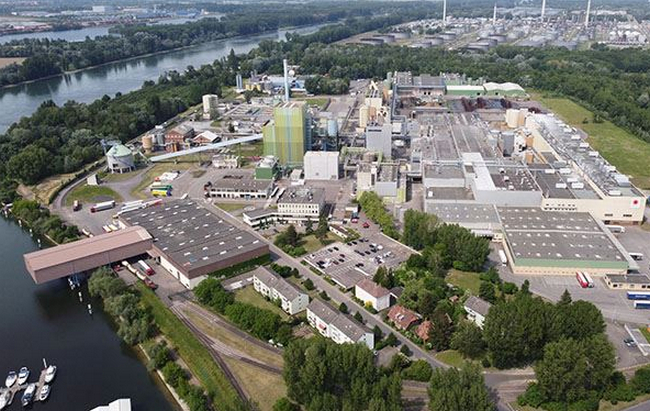 Maxau paper site
Maxau paper site
The transaction will reduce Stora Enso’s annual SC paper capacity by 530,000 tonnes. Based on the 2021 figures, the divestment is expected to reduce Stora Enso’s annual sales by approximately EUR 250 million. Subject to closing date adjustments, Stora Enso will book a one-time disposal gain of approximately EUR 50 million, in its IFRS operating profit in the first quarter of 2023, considered as an item affecting comparability.
The divestment process continues for the remaining paper sites in Nymölla, Hylte and Anjala with no committed timeline for conclusion. The process has no immediate effect on Stora Enso’s paper operations which continue to serve their respective customers. There is a feasibility study ongoing at the Langerbrugge site for the potential conversion of one of the two paper lines into a containerboard line. Stora Enso continues to serve its Langerbrugge paper customers at least until the end of 2024.
Stora Enso currently has five paper production sites. In total, the Paper division currently employs approximately 2,300 employees. In 2021, Paper division’s net sales amounted to EUR 1,703 million.
BofA Securities acted as Stora Enso’s financial advisor on this transaction.
About Schwarz Produktion
Schwarz Produktion is the umbrella brand for the production companies of Schwarz Group. In total, more than 4,500 employees in the Schwarz Produktion companies produce high-quality food as well as sustainable packaging and materials for the retail companies Lidl and Kaufland. In addition to mineral water and soft drinks, the Schwarz Produktion companies also produce chocolate, dried fruit, baked goods, coffee and ice cream. In addition, three plastic and recycling plants are a central component of a unique PET materials cycle. Further information about Schwarz Group here.
Part of the global bioeconomy, Stora Enso is a leading provider of renewable products in packaging, biomaterials, wooden construction and paper, and one of the largest private forest owners in the world. We believe that everything that is made from fossil-based materials today can be made from a tree tomorrow. Stora Enso has approximately 22,000 employees and our sales in 2021 were EUR 10.2 billion. Stora Enso shares are listed on Nasdaq Helsinki Oy (STEAV, STERV) and Nasdaq Stockholm AB (STE A, STE R). In addition, the shares are traded in the USA as ADRs (SEOAY). storaenso.com/investors
Industry veteran Carlos Reinoso joins ETS Board
Reinforcing Tissue Industry management and bringing particular EU expertise
European Tissue Symposium (ETS) is delighted to announce that Carlos Reinoso has been appointed as vice chairman with immediate effect.
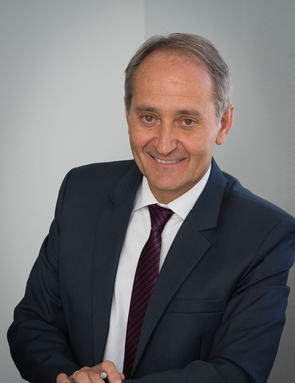 Reinoso, who holds a master’s degree in Forest Sciences, has more than 20 years of experience in the paper sector and has held influential positions in trade associations at both European and national levels. Currently, director general of the Spanish Association of Pulp and Paper Manufacturers (ASPAPEL), he has worked for the Confederation of European Paper Industries (CEPI) in Brussels and is now a member of the CEPI steering committee. He also coordinates the Alliance for Competitiveness of Spanish Industry and is active in the Spanish Employers Federation.
Reinoso, who holds a master’s degree in Forest Sciences, has more than 20 years of experience in the paper sector and has held influential positions in trade associations at both European and national levels. Currently, director general of the Spanish Association of Pulp and Paper Manufacturers (ASPAPEL), he has worked for the Confederation of European Paper Industries (CEPI) in Brussels and is now a member of the CEPI steering committee. He also coordinates the Alliance for Competitiveness of Spanish Industry and is active in the Spanish Employers Federation.
Commenting on the appointment, ETS chairman Fanis Papakostas said, “I am delighted to welcome Carlos to the team. His arrival reinforces our strategic capability and his wealth of experience and strong contacts both in the industry and in Brussels will make him an invaluable asset.”
Carlos Reinoso said, “It’s an honour to join the ETS Board. I look forward to working alongside colleagues from across Europe to defend and advance the interests of our sector and educate customers and policymakers on the benefits of paper tissue.”
Tissue paper products including toilet tissue, kitchen roll and hand towels are the go-to choice in both commercial and domestic settings due to their excellent hygiene properties – something that the Covid-pandemic served to underline further. The sector is also committed to showcasing its first-class sustainability credentials: 100% natural, biodegradable and made from a renewable resources.
Carlos Reinoso, 58, is a Spanish National and holds a BSc in Forest Engineering from the Politecnic University of Madrid and a Masters in Forest Sciences from the University of Melbourne, Australia. He speaks Spanish, English and French. Carlos is married and has two sons and a daughter.
About ETS
ETS is the European Tissue Paper Industry Association. The members of ETS represent the majority of tissue paper producers throughout Europe and around 90% of the total European tissue production. ETS was founded in 1971 and is based in Brussels. For more information: www.europeantissue.com
